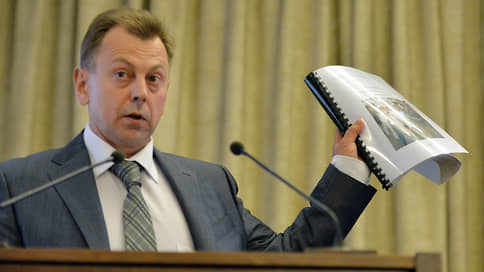The right to self-separation – Newspaper Kommersant No. 180 (7381) dated 09/29/2022
[ad_1]

Member of the Central Election Commission Igor Borisov published in the departmental magazine “Citizen. Elections. Power” a scientific article (co-authored with Doctor of Law Ilya Chistoborodov) on how to justify, from the point of view of international law, the accession to Russia of the Donetsk and Luhansk People’s Republics (DPR and LPR), as well as parts of the Zaporozhye and Kherson regions of Ukraine. According to the authors, Moscow can appeal to the right of these territories to human rights secession (secession from the state for humanitarian reasons). The long-term war of the “parent state” with its population legitimized the people’s right to decide on their own destiny, and the nationwide plebiscite makes it possible to realize it, the article emphasizes.
Recognition of the results of referendums in the DPR and LPR is more of a political issue, but the search for possible legal solutions within the framework of international law should begin now, according to an article by Igor Borisov and Ilya Chistoborodov. In particular, in their opinion, such a solution could be an appeal to one of the fundamental principles of international law – the right of peoples to self-determination, which is enshrined in many international documents, including the UN Charter and the 1970 Declaration on Principles of International Law.
The right to self-determination comes into conflict with the principle of the territorial integrity of states, but the unity and inalienability of the territory are not absolute and unconditional values, the article notes. International law allows their violation “under certain conditions” – in particular, when national-ethnic groups are subjected to excessive open discrimination by the state. Namely, this, according to the authors, is happening now in Ukraine.
In this case, they are sure, we should talk about the right to human rights secession – the unilateral separation of the territory to protect its population from massive, gross and systematic cases of human rights violations. This form of self-determination should be considered as a “last resort” and can only be used in exceptional circumstances, when it comes to very serious violations, and the responsibility for secession lies with the “parent state”. At the same time, the assistance of other states to “local rebels” in the implementation of self-determination may be acceptable, the authors write with reference to the opinion of the well-known theorist of international law and judge of the International Court of Justice James Crawford.
Examples of the exercise of such a right are quite rare, but they do exist: in 1836 Texas separated from Mexico, in 1991 the former Soviet republics left the USSR, in 2008 the “collective West” recognized Kosovo’s withdrawal from Serbia. In some cases, this did not even require a direct expression of will, but in the situation with the Ukrainian territories it is necessary to comply with all the standards of electoral processes, the authors insist: this is important for the international recognition of the will of the population. “Now the degree of tension in the region and the actual involvement of NATO countries in hostilities is unlikely to allow the implementation of procedures for the recognition by the world community of the result of the will of the peoples,” Mr. Borisov explained to Kommersant. “But over time, it will simply be impossible to ignore or try not to notice its results.” In his opinion, the special significance of referendums is also that they open, albeit delayed, but quite legitimate access to include the issue of self-determination of citizens on the international agenda.
According to Kommersant’s information, the administration of the President of the Russian Federation is really concerned about establishing a legal basis for the annexation of new territories to Russia. But for now, this work is more informational in nature. According to a Kommersant source in the administration, international recognition of the referendums is possible “only in the future.”
Apparently, Russia, after its expulsion from the Council of Europe, will justify the right of new territories to secession at the UN platforms, primarily in the Human Rights Council, Ilya Rachkov, an associate professor at MGIMO, believes. But at the same time, according to him, it will be necessary to seriously prove that the population was oppressed by the authorities and was subjected to constant humiliation and oppression. Although this can be done now, the expert points out, for example, in the International Court of Justice, where Ukraine’s claim against Russia on violation of the Convention on the Elimination of All Forms of Racial Discrimination and the International Convention for the Suppression of the Financing of Terrorism is being considered (before January 2023, Russia must submit its written position on the merits of the dispute). Moscow refused to participate in the second case on the claim of Ukraine – on Russia’s violation of the Convention on Genocide (Kyiv believes that the Russian Federation, calling one of the reasons for the special operation “genocide of the Russian population” in Donbass, incorrectly interprets this document) – Moscow refused, recalls Mr. Rachkov. However, “out of respect for the court”, the Russian authorities presented a written position in which they stated that they base their actions on the principles of self-defense and the right of nations to self-determination. The accusation of the Ukrainian authorities of genocide, the appeal says, was not the primary reason for the special operation, so Russia’s actions cannot be called a violation of the Genocide Convention and assessed by the International Court of Justice.
[ad_2]
Source link








